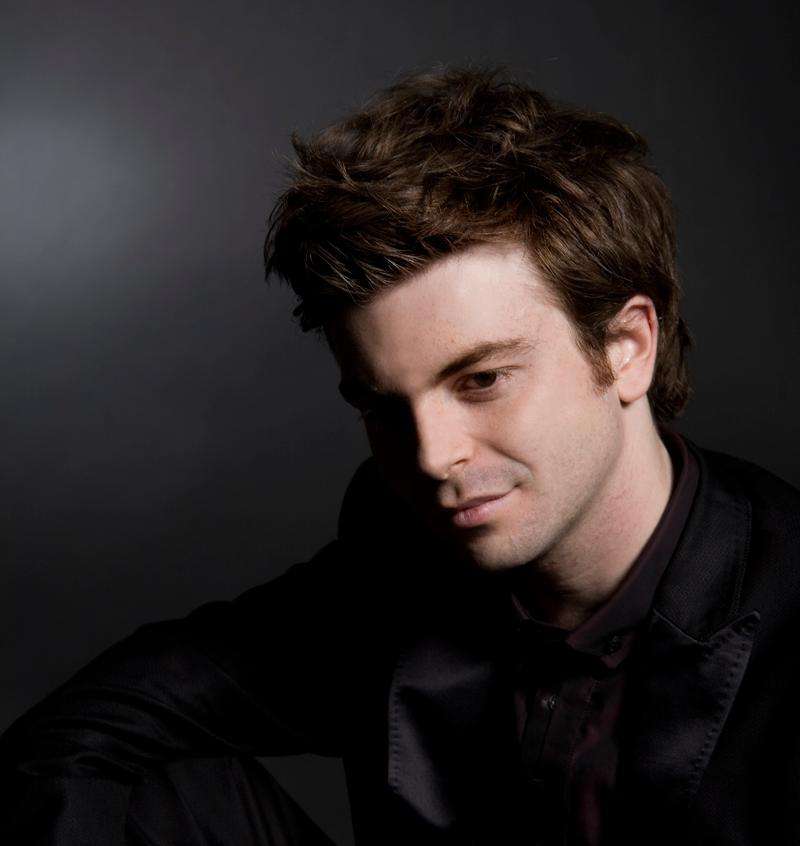|
Back
Les doigts sont d’exquis danseurs New York
Grace Rainey Auditorium, Metropolitan Museum of Art
10/31/2010 -
Franz Josef Haydn: Variations in F Minor
Robert Schumann: Grand Sonata in F Minor, Opus 14
Richard Wagner/Ferenc Liszt: “Spinning Chorus” from The Flying Dutchman
Dmitri Shostakovich: Preludes from Opus 34: Numbers 1, 2, 21, 5, 9, 10, 11, 13, 14, 15, 16, 19, 20 & 24
Claude Debussy: Preludes: “Les fées sont d’exquises danseuses” (Second Book) – “Ce qu’a vu le vent d’ouest” (First Book)
David Kadouch (Pianist)

D. Kadouch (© Caroline Doutre)
The written biography of the boyish pianist on stage for his New York debut almost said it all. David Kadouch looked boyish because he is only 24. A prize winner at the Leeds and Beethoven Bonn competitions, he has become already established in Europe. Daniel Barenboim asked him to replace Murray Perahia and Lang Lang in Israel and the West Bank respectively. And while this is his first New York solo appearance, he had already appeared with Itzhak Perlman in the Metropolitan music series.
Those were mere words. Mr. Kadouch’s nationality, though, came in the very first notes of Haydn’s popular F Minor Variations, where Mr. Kadouch could easily have been playing Couperin, from his native France. These wonderful major-minor variations can shine with the brightest color, but Mr. Kadouch never attempted to break loose from the notes. He was hardly elegant or over-fastidious. But this was distinctly 18th Century music that was clean, balanced, and–like nuns fretting not at their cloister doors–was beautiful in its limited scope.
Then again, Mr. Kadouch was not the young fiery pianist which one would have expected. His trills are smooth and shaded, as in the Liszt-Wagner Spinning Wheel. He had a grace in his Debussy preludes, and even in the busy Schumann Concerto Without Orchestra, Mr. Kadouch managed a unity.
Initially, granted, one wold have trembled at hearing such a youthful pianist tackling Schumann the same week as András Schiff’s all-Schumann program. But Mr. Schiff’s other-worldly performance had nothing to do with Mr. Kadouch’s brilliant earth-bound technique. More important, I cannot remember any pianist playing this Third Sonata–in New York.
Probably nobody plays the five-movement version, and Mr. Kadouch took the revised four-movement work, and gave it a sense of urgency without the usual over-pedaling when others play that work. If Mr. Kadouch is a Young Lion, his feral moods disappeared into the music. The new generation is cool, controlled, not ready to go to the clifftops of either emotion or eccentricity.
Two movements stood out. First the set of variations on a theme by Clara (soon-to-be) Schumann, a gentle group. But second, he took the finale, a “fast-as-possible” movement of utter tension, with themes almost falling over themselves. Somehow, he made it coalesce. The final six chords were not played, they were painted in different dynamic colors. Whatever the weakness of the work, Mr. Kadouch had a rare textural clarity which made it actually work.
As rare as the Schumann are Shostakovich’s very early Preludes, from which he chose 19, as shown above. I wasn’t able to gauge why he played them in this order, as the composer arranged them, Chopin style, the keys going up and around in fifths. Mr. Kadouch eschewed this, sticking mainly with the fast, dance-like preludes in different forms.
One might think that the composer, writing this after his acerbic Lady Macbeth opera, would have been fiercely violent. And yes, there were a few delicious barbs and dances. But Mr Kadouch respected Shostakovich as a pianist, and his own piano-playing was clear, transparent, emphasizing the middle voices even when the tunes were happily vulgar or sarcastically marital.
The final works, before an elegant Chopin encore, contrasted with the Metropolitan Egypt exhibit outside. The latter was heavy on death and nobility. When Mr. Kadouch played “The Fairies are Exquisite Dancers”, Debussy’s sylphs whirled around or sometimes sung. Mr. Kadouch's inimitable trills were exercised in a dozen incarnations.
The following “West Wind” might have puzzled the New York half. The French in the audience knew that “west” was not gentle, but surging, pulsing, stormy. Mr. Kadouch allowed the crescendos and decrescendos their due, played the pedals subtly to allow the storm to enter, subside and begin all over again...
In total, where one was expecting a pianist brash, almost throwing his amazing successes in our visages, Mr. Kadouch allowed his innate artistry and French sense of nuance to create a captivating evening.
Harry Rolnick
|